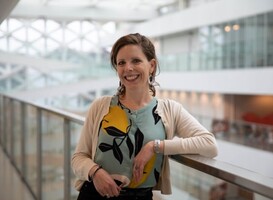From the Good Living with Dementia lectorate, the lector wants to contribute to a different way of looking at dementia: “That the emphasis will once again be on the person, instead of on the condition. With our research we want to ensure that people with dementia and their carers can continue to lead a good life. While preserving autonomy, inclusion, participation, dignity, well-being and meaning. We need to look more at what a person can do rather than what he can no longer do. Our aim is that we, as care and welfare professionals and as a society, do not forget about the human being – who is behind dementia.”
Best able to support
And this is necessary, according to the new lecturer, because there are currently an estimated 290,000 people with dementia in the Netherlands. And the current forecast is that this number will rise to about 420,000 in 2030 and to 520,000 in 2040. Almost doubling in less than 20 years. “The chance is high and therefore increasing that everyone will be confronted with dementia,” says the lecturer. “Myself, in the private sphere – from a father, grandmother to brother – or as a healthcare professional or informal carer.” Unfortunately, there is currently no cure for dementia. The question of how we can nevertheless best support this growing group of people with dementia with a possibly different, but still a good life, is therefore gaining in urgency. Because, like the lecturer with the title of her speech wants to clarify, also for someone with dementia: there is no better life than a good life.
Differences between people
A second reason why research into a good life with dementia is important is the fact that the group of people with dementia is quite diverse. Not only in terms of appearances and stages of dementia, but also in terms of age. “Age is indeed the most important risk factor for dementia, yet in the Netherlands there are an estimated 15,000 people with dementia who are younger than 65 years,” says Simone de Bruin. “As a result, their family situations, work, hobbies and social contacts vary. And so are their wishes and needs. People with dementia also differ in their cultural background and their living situations. For example, do they live at home or in a nursing home?” These differences between people influence how you give substance to and support in leading a good life. The lecturer sets to work with questions such as these.
Starting points
The lectorate’s approach is in line with a change in the way in which dementia care and dementia are viewed. De Bruin: “Previously, the focus was mainly on the disease itself, physical care and the safety of people with dementia. Less attention was paid to psychosocial needs. That call is getting louder. There is thus a shift from a more medical-somatic to a more psychosocial model of care. From a routine approach in large-scale nursing homes, where these routines determined the lives of residents, to seeing the person behind the patient again, so to speak. And this is where the research comes in. By zooming in on differences and looking at multiple levels around people with dementia, in other words the level of the person with dementia, the social environment, the living, residential and care environment and the national context. Because this offers starting points in supporting a good life with dementia. Always in collaboration with the target group, carers and professionals, various disciplines and education.”
Living well with dementia
Three themes are central. First of all, the meaning of a good life with dementia and a ‘Good life with dementia’ model. What exactly is a good life with dementia? And how can this come under pressure? Theme two focuses on innovation in the care and living environment. Think of innovations in which ‘normal life’ and outdoor living are central, such as care farms. We know that people benefit from this form of care. But does this also apply if you have a migration background? This has not yet been researched. Or what competences do healthcare and welfare professionals need to deploy social and technological innovations in healthcare, and what does this mean for how they are trained? The third theme is access to and coordination of care and support. How do we ensure an accessible range of care and support, for everyone, regardless of your cultural background? And how do you also keep an eye on the wishes and needs of informal carers?
Reader
dr. ir. Simone de Bruin has extensive experience in research into elderly care and dementia care. Before her appointment as a lecturer, she worked at the National Institute for Public Health and the Environment (RIVM), Center for Nutrition, Prevention and Care, TNO and Wageningen University. Simone de Bruin studied Household and Consumer Sciences at Wageningen University and graduated cum laude in 2001. She obtained her PhD at the same university for a research into daytime activities on care farms, as an innovative form of care for people with dementia.
By: National Education Guide
Image: Windesheim University of Applied Sciences
–

